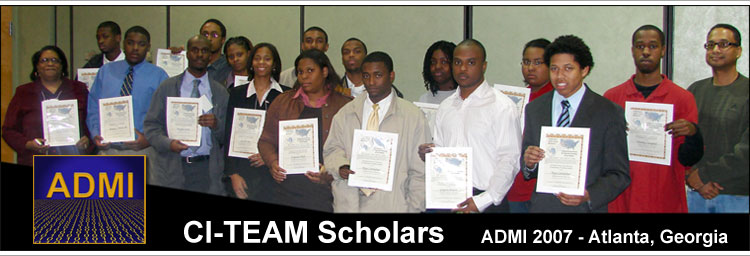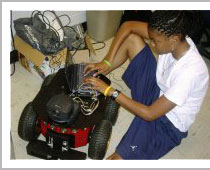 |
About CI-Team @ ECSU |
The vision and goals of the NSF CI-Team at ECSU project, "Cyberinfrastructure for Remote Sensing of Ice Sheets," are based on the fact that "educational settings, audiences, and goals are too important to be adequately addressed as afterthoughts or add-ons to Cyberinfrastructure projects and, instead, must be treated as high priorities integrated in a project's overall design". As such, the NSF CI-Team at ECSU project aggressively engages computer science and engineering students from five minority universities in the Grid, remote sensing, and CReSIS training, seminars, workshops and classes. Elizabeth City State University will establish a minimal Grid configuration and a virtual classroom environment with broadcast and receiving capabilities. With regards to the Grid, access will be implemented through web and research portals for use of computational and data resources. The portals will be customized with educational and science inter-faces while still allowing access to large amounts of data. The virtual classroom configuration will consist of a Polycom 8000S system with 14-kHz wideband audio, 2 channels of 14-kHz audio, stand-alone audio conferencing phone, IP (H.232 and SIP) interfaces and Global Management System collaborative communications. The system will have standards compliance for traversing NATs and firewalls. Existing plasma display units will be connected to the 8000S system. For receiving at the partner institutions, VIAVideo for desktop PCs will be provided to allow point-to-point connectivity. ConferenceXP by Microsoft will also be offered as an option for partner institutions. The first of these projects is an NSF CI-Team at ECSU project (PI: Hayden, Co-PIs: Fox and Gogineni), "Cyberinfrastructure for Remote Sensing of Ice Sheets," which establishes a CReSIS Science Gateway for TeraGrid working with ADMI, IU, CReSIS, MSICI2, and TeraGrid. The project demonstrates a compelling vision to provide a model for the development of MSI capacity to prepare students for a future in CI-enabled science, the knowledge-based economy, and the scientific professoriate.
|
National Science Foundation CI-TEAM Implementation Project Cyberinfrastructure for Remote Sensing of Ice Sheets NSF Grant OCI-0636361 Any opinions, findings, and conclusions or recommendations expressed in this material are those of the author(s) and do not necessarily reflect the views of the National Science Foundation. |

 With regards to interdisciplinary research, the implementation of the GRID technologies across the academic community will enable routine interactions among investigators from CReSIS and others at dispersed locations to improve in frequency and productivity, and generalize the current education and research collaborations. The existing suite of collaborations offers a strong base to build on and establish a new class of coordinated educational activities. ECSU is in the process of creating a virtual classroom (VC) and a TeraGrid gateway for remote sensing applications to ice-sheet research and education. In addition, aggressive efforts to engage computer science and engineering students from Minority-Serving Institutions in the GRID, remote sensing, and CReSIS training, seminars, workshops and classes are underway through the ADMI institutions.
With regards to interdisciplinary research, the implementation of the GRID technologies across the academic community will enable routine interactions among investigators from CReSIS and others at dispersed locations to improve in frequency and productivity, and generalize the current education and research collaborations. The existing suite of collaborations offers a strong base to build on and establish a new class of coordinated educational activities. ECSU is in the process of creating a virtual classroom (VC) and a TeraGrid gateway for remote sensing applications to ice-sheet research and education. In addition, aggressive efforts to engage computer science and engineering students from Minority-Serving Institutions in the GRID, remote sensing, and CReSIS training, seminars, workshops and classes are underway through the ADMI institutions. 